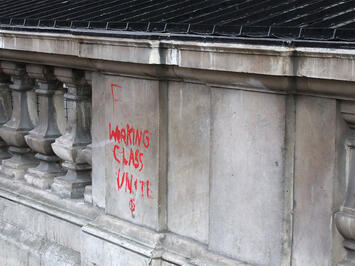
Like its global predecessors, the COP26 Glasgow conference will usher in a new wave of apocalyptic warnings about climate change. It will also likely prove no more successful, in terms of actually addressing the issue, than its predecessors, particularly as China, India and other developing countries ramp up their emissions.
Nevertheless, none of this will force the climate activists to reconsider how the current strategies against global warming could break the backs of the already beleaguered working and middle class. (For British readers, I use the phrase ‘middle class’ here in the American – less bourgeois – sense.) The climate chorus of celebrities, oligarchs and royals may feel virtuous, but for most people the future could prove to be propertyless proletarianisation. Many of those in Glasgow at the moment pray at the altar of ‘de-growth’. They want to limit the consumption of the working and middle classes, undermine their jobs, raise their energy bills, and inhibit their ability to buy property or travel.
These policies are fine with ‘woke’ corporatists like BlackRock, who see enormous profits in the regulated shift in energy, even as they seek to expand their business with the world’s dominant polluter, China. What’s missing is any focus on how to cut emissions without causing high inflation, raising energy prices and destroying the middle class. So far, more palatable options, like increasing remote work, geothermal energy, natural gas, nuclear power and varied new technologies, have not managed to get on to the agenda.
With climate, as with many other issues, the upper classes are inflicting their own preferences on working- and middle-class people. As nonprofits, oligarchs and bureaucrats plot out the future, small business owners and the middle class, as one entrepreneur put it, are ‘not at the table – or even in the room’. This is the very class – what I refer to as the yeomanry – that has driven much of the West’s economic progress and nurtured self-government. Democracy was born when both Athens and later Rome included small property owners in governance. Democracy died when these small owners lost power to what Aristotle labelled the ‘oligarchia’.
After the autocratic Middle Ages, both human progress and self-rule came back as the middle classes began to rise – first in Italy but then more profoundly, and more pervasively, in the Netherlands and the British Isles, before spreading to North America and Oceania, where there was no true hereditary aristocracy. Students of classical experience, such as Thomas Jefferson, James Madison and John Adams, all considered the over-concentration of property in a few hands as a basic threat to republican institutions, an insight shared by such intellects as Edmund Burke, Alexis de Tocqueville and Adam Smith.
After the brutalities of the early Industrial Revolution, and two world wars, the middle class thrived not just in America, but also in Britain, Australia, Canada and increasingly in East Asia. But by the 1970s we began what has become an inexorable march towards an ever more feudalistic structure. The Organisation for Economic Cooperation and Development has noted that, across the 36 wealthier countries, the uber-wealthy have taken an ever greater share of national GDP in recent decades, while the middle class ‘looks increasingly like a boat in rocky waters’.
These patterns are clearly evident in the United States, where wealth gains have been especially concentrated among the top 0.1 per cent. The share of national wealth held by those below the top 10 per cent has fallen since the 1980s by 12 percentage points, the same proportion that the top 0.1 per cent have gained. Today, roughly half of all Americans earn less than $35,000 annually, living essentially pay cheque to pay cheque.
Even with their robust social-welfare provisions, over two thirds of European Union countries, including Sweden, have experienced declining social mobility. Germany is significantly less equal than its EU peers, with richer households controlling a bigger share of assets than in most other Western European states. The bottom 40 per cent of German adults hold almost no assets at all; barely 45 per cent of Germans own homes. Even in theoretically socialist China the top one per cent of the population hold about one third of the country’s wealth. Meanwhile, the prospects for the Chinese middle class are fading, particularly in light of the recent debt and housing crisis.
Read the rest of this piece at Spiked.
Joel Kotkin is the author of The Coming of Neo-Feudalism: A Warning to the Global Middle Class. He is the Roger Hobbs Presidential Fellow in Urban Futures at Chapman University and Executive Director for Urban Reform Institute. Learn more at joelkotkin.com and follow him on Twitter @joelkotkin.
Photo: Paul Farmer, via Geograph.org.uk, CC 2.0 License.












